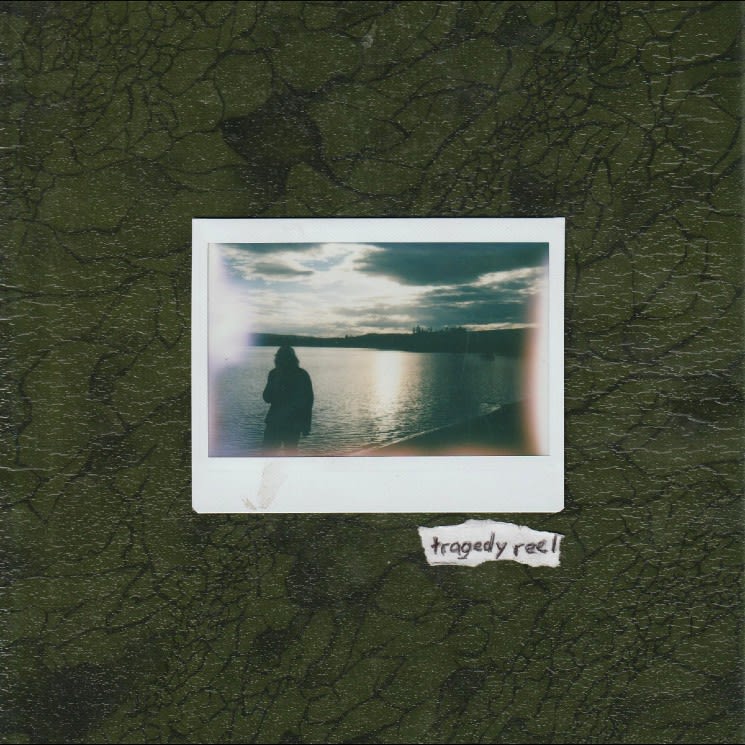If there is one artist who understands unfathomable isolation and falling hopelessly lost in one's thoughts, it's Aaron Powell, also known as Fog Lake. For almost a decade, Powell has been making downcast, introverted music largely based around his experiences growing up in rural Newfoundland, where Powell spent the summer of 2020 recording his latest album, Tragedy Reel.
Fog Lake's seventh full-length is Powell's most solemn and sparse work to date, which is saying something coming from an artist who has defined his musical identity by bleak ambient textures dimly passed through melancholic filters. The seclusion is more intensely felt on Tragedy Reel, soaking into the bones and seeping throughout the mind. While past Fog Lake albums have had subtle, grainy layers of mood-shifting effects, Tragedy Reel is relatively clean with little more than guitar, piano and a bit of reverb. Tragedy Reel sounds like it was both recorded in a cavernous church and sighed directly into your ear at the same time.
The broad, enveloping strokes on the grand piano creepily lingers and deeply fills the emptiness on songs like "Sullivan" and "June" while Powell's gauzy, tender vocals barely escape into the air as a faint croon, hardly above a whisper. Tragedy Reel's largely glacial pace is its greatest strength — there is nowhere to hide and plenty of space to drift along with Powell's late-night murmurings detailing moments that slipped away and losing feelings of love before fully realizing it.
"I don't wanna die without knowing you," Powell sings on "Dakota," a song about the restlessness of not belonging in any one place and second-guessing choices while trying to reverse them. The delicate banjo and yearning violin creates a cozy sense of home, yet Powell's unease about not having one is a gorgeous, contrasting moment on Tragedy Reel. Similarly, on album opener "Crystalline," apprehensive tones teeter back and forth anxiously as Powell quietly exclaims, "no one gets even in this town I've been away from so long," before the trauma is temporarily forgotten as a blissful piano outro calms the nerves.
As with Fog Lake's past work, Powell alludes to the smallest glimmer of hopefulness beneath his words of despair. The tiny pitter-patter of a snare at the start of "Jitterbug" is played as quietly as possible, mimicking the slightest drops of rain. It works to create a soothing dampness throughout the song, one of Fog Lake's best yet. The piano and guitar are slowed even further to a wispy grey fog on "Latter Day Saint," while Powell's voice is impossibly fragile, careful not to wither away with the gentle descent of its heavenly melody.
Fog Lake's music is about making amends with yourself before you can learn to love the people and environment around you. Tragedy Reel shows Powell letting out these emotions in the most direct, intimate way he knows — with minimal, depressed instrumentation and enabling all of the complex levels of sadness to sway together in the shadows.
(Orchid Tapes)Fog Lake's seventh full-length is Powell's most solemn and sparse work to date, which is saying something coming from an artist who has defined his musical identity by bleak ambient textures dimly passed through melancholic filters. The seclusion is more intensely felt on Tragedy Reel, soaking into the bones and seeping throughout the mind. While past Fog Lake albums have had subtle, grainy layers of mood-shifting effects, Tragedy Reel is relatively clean with little more than guitar, piano and a bit of reverb. Tragedy Reel sounds like it was both recorded in a cavernous church and sighed directly into your ear at the same time.
The broad, enveloping strokes on the grand piano creepily lingers and deeply fills the emptiness on songs like "Sullivan" and "June" while Powell's gauzy, tender vocals barely escape into the air as a faint croon, hardly above a whisper. Tragedy Reel's largely glacial pace is its greatest strength — there is nowhere to hide and plenty of space to drift along with Powell's late-night murmurings detailing moments that slipped away and losing feelings of love before fully realizing it.
"I don't wanna die without knowing you," Powell sings on "Dakota," a song about the restlessness of not belonging in any one place and second-guessing choices while trying to reverse them. The delicate banjo and yearning violin creates a cozy sense of home, yet Powell's unease about not having one is a gorgeous, contrasting moment on Tragedy Reel. Similarly, on album opener "Crystalline," apprehensive tones teeter back and forth anxiously as Powell quietly exclaims, "no one gets even in this town I've been away from so long," before the trauma is temporarily forgotten as a blissful piano outro calms the nerves.
As with Fog Lake's past work, Powell alludes to the smallest glimmer of hopefulness beneath his words of despair. The tiny pitter-patter of a snare at the start of "Jitterbug" is played as quietly as possible, mimicking the slightest drops of rain. It works to create a soothing dampness throughout the song, one of Fog Lake's best yet. The piano and guitar are slowed even further to a wispy grey fog on "Latter Day Saint," while Powell's voice is impossibly fragile, careful not to wither away with the gentle descent of its heavenly melody.
Fog Lake's music is about making amends with yourself before you can learn to love the people and environment around you. Tragedy Reel shows Powell letting out these emotions in the most direct, intimate way he knows — with minimal, depressed instrumentation and enabling all of the complex levels of sadness to sway together in the shadows.
